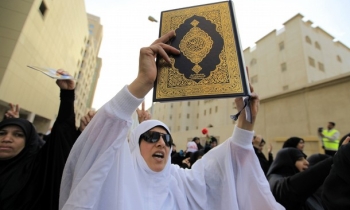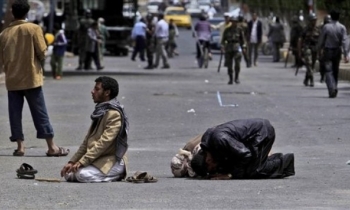Attacks on freedom of expression riding on notorious laws are increasing in Bahrain.
Recent incidents have prompted 26 International Freedom of Expression eXchange (IFEX) members and 21 other organisations, led by the Bahrain Centre for Human Rights (BCHR), to urge the authorities to stop their latest clampdown on free expression. The organisations in their call to Bahraini government have expressed their deep concern about the serious deterioration of freedom of expression in Bahrain.

The demand by IFEX members come on grounds that Bahraini writers, journalists and activists have been prosecuted through the courts for exercising their right to free expression. Bahraini authorities have taken severe measures against activists to prevent them from reaching the public through media outlets, have blocked access to websites, have banned films, prohibited the printing of fictional and non-fictional books, and, they have prosecuted writers and journalists for practicing their professions and expressing their beliefs.
In their call to the government, the members said these regulations have restricted all the rights and freedom to express. It includes abolishing of rights to post information about public issues on Internet sites, the right to print and distribute academic, documentary and artistic publications, the right to watch films of public interest (documentary, drama, action, fiction, etc), the right to express views, as journalists, writers, authors and bloggers and also the right for human rights defenders and activists to access media.
Every headline in Bahrain in recent times has been about obliteration of some form of expression or the other with either an absurd reason or none at all. On October 28, 2007, the Supreme Criminal Court of Appeals convicted journalist Hesham Al-Zayani and the editor-in-chief of Akhbar Al-Khaleej newspaper of smear and defamation against the President of Arabian University. They were fined a liability of BD 1000 (approx US$2,650).
The journalists are being targeted by charges based on controversial articles of the 2002 Press and Publication Law and 1976 Penal Code and they have been criticised for not meeting international standards. The offending articles have been used in recent months to interrogate and prosecute 14 journalists, bloggers and website administrators.
The other episodes also include the ban without an explanation over popular Hollywood film The Kingdom which explores the "war on terror" through a fictional story set in Saudi Arabia.
Women's rights activist and president of the Bahrain Women's Petition Ghada Jamsheer was given formal notice that she was not to appear in any Bahraini media because of a letter she wrote to the king and called for the Supreme Council for Women, chaired by the king's wife, to be dissolved for being politically loyal to the government and not promoting women's rights.
The HAQ movement that calls for respect for human rights and democratization in Bahrain has its official website blocked. It is one of the 26 websites that have been blocked this year in the country, by Batelco, Bahrain's only Internet service provider which is government owned. These blockages were mainly in reaction to online reporting about political scandals in Bahrain, especially about the misappropriation of public lands, administrative and financial corruption, discrimination and favoritism.
Statistics from the Bahrain Journalists Association (BJA) show that in 2006, the total number of cases brought against journalists was 27, of which only 7 (26 per cent) were adopted by the public prosecution. In 2007, and as per the same source, the total number of cases against journalists is 32 of which 12 (38 per cent) have been moved by the prosecution, which shows the dramatic deterioration of freedom of expression in general and journalism in particular. BJA, acting as mediator, was successful in amicably convincing many individuals, mostly government officials, to drop their cases. This role played by BJA, however, has not reduced the number of cases brought against journalists.
Along with amendments in the law where it needs to reach to international standards the members have asked the authorities to respect the freedom of citizens and value their rights. The members have called upon calling on them to cease hindering the access of human rights defenders to the media and other means of public communication as well as have urged the government to stop harassing and intimidating the defenders.
The call on to the Bahraini authorities by the IFEX and other organizations have been towards asking them to stop harassing journalist and writers, requesting that they lift the bans on all electronic sites dealing with public, cultural and human rights affairs relevant to Bahrain and urging them to nullify those laws that infringe upon free expression, to ensure conformity with international human rights standards.









